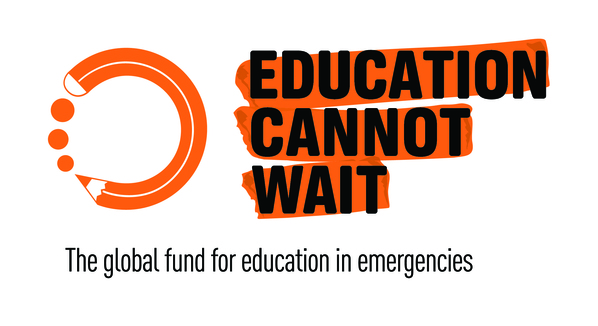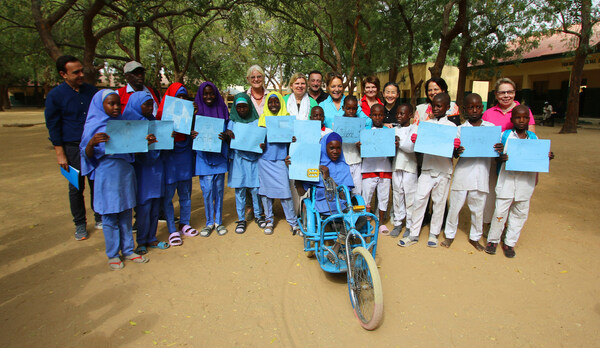 |
ECW plans to renew multi-year investment that has already exceeded its targets and reached over 400,000 children and adolescents with quality, holistic education in areas affected by the crisis in North-East Nigeria with up to US$15 million. However, top-up and additional funding is urgently needed to optimize its proven success.
MAIDUGURI, Nigeria, Feb. 24, 2024 /PRNewswire/ -- On a high-level mission in Nigeria this week, Education Cannot Wait (ECW) Executive Director Yasmine Sherif, accompanied by high-level representatives from the Governments of Germany and Norway, announced a planned US$15 million allocation to renew the ECW Multi-Year Resilience Programme in the North-East of the country. The funding is subject to ECW's Executive Committee approval.

On the mission, Dr Heike Kuhn, Co-Chair of the ECW Executive Committee and Head of Education Division at Germany's Federal Ministry for Economic Cooperation and Development, Merete Lundemo, Co-Chair of the ECW Executive Committee and Special Envoy for Education in Crisis and Conflict for Norway's Ministry of Foreign Affairs, and ECW's Executive Director Yasmine Sherif met with senior government officials, including the Minister of Education, Hon. Dr. Tahir Mamman, and Borno State Governor, Prof. Babagana Umara Zulum, and aid partners.
In coordination with the Borno State Government to ensure the right to education for girls and boys, the delegation travelled to the North-East, where the violence of the Boko Haram insurgency and other armed groups has disrupted the education of nearly 2 million school-age children.
Attacks against schools and other grave violations of children's rights are regularly registered in the region. Thousands of children and youth – in particular girls and young women – have been abducted. Many girls have been enslaved and sexually exploited and boys have been forced to become child soldiers.
In Maiduguri, the delegation visited communities affected by the conflict and other interconnected crises and saw first-hand the positive impact of ECW's initial Multi-Year Resilience Programme (2021-2024), delivered in coordination and jointly by the Norwegian Refugee Council, Save the Children and UNICEF.
The delegation also met with survivors of conflict-related sexual violence who are co-creating a new innovative project launched by the Global Survivors Fund with funding support from ECW. The initiative provides formal and non-formal education as a form of reparation for survivors of conflict-related sexual violence and their children.
"Children – especially girls – pay the heaviest price of the horrific violence that has plagued the North-East of Nigeria for more than a decade. Their learning lost and development delayed, they suffer from the trauma of abductions and sexual violence. In response, safe, quality, holistic education and learning opportunities, including mental health and psychosocial services, are crucial to rehabilitate and protect children and youth from exploitation and empower them to become positive changemakers. Working with the Government of Nigeria and our implementing partners, ECW's expanded funding in the North-East is an investment in their young lives as well as in a more stable, prosperous and peaceful future for the region and beyond," said Yasmine Sherif.
"I call on additional strategic donor partners – governments, the private sector, philanthropic foundations and high net-worth individuals – to join our efforts in mobilizing an additional US$600 million to reach our target of US$1.5 billion for ECW, allowing our partners to reach, by 2026, a total of 20 million girls and boys in crises affected areas of the world," she said.
Germany is Education Cannot Wait's leading donor with US$366 million in total contributions, and Norway is the Fund's fifth largest donor with total contributions of US$131 million.
"Building resilient education systems for increased access to inclusive, quality, and lifelong learning is crucial for Nigeria, as half of its population are children and youth. Educating children means to change their lives, letting them participate in building peaceful sustainable societies. The African Union has just launched the Year of Education 2024 and we are looking forward to advancing education jointly with our partners," said Dr Heike Kuhn.
"Education is a lifeline for children living in areas affected by armed conflict. Norway welcomes the strengthened cooperation with Education Cannot Wait to reach the most vulnerable with education in North-East Nigeria. This is part of Norway's wider engagement for children living in armed conflict. It has been great to see how these education projects bring much needed relief and normalcy to children in this area," said Merete Lundemo.
As part of continued efforts in all investments to capitalize on collaboration between ECW and the Global Partnership for Education (GPE), the mission highlighted the opportunity of aligning the upcoming financing of US$5 million from GPE for the North-East states with the new ECW Multi-Year Resilience Programme which will be developed this year.
ECW's new catalytic grant funding for the planned Multi-Year Resilience Programme shall build on its US$23.6 million investments in the North-East of Nigeria, which have reached more than 400,000 children since 2018. The investments are delivered in partnership with the Ministry of Education, UN agencies, and international and local civil society partners. With a focus on building lasting solutions applying the humanitarian-development-peace nexus, ECW investments in North-East Nigeria have provided children with learning materials, supported teacher training and incentives, school feeding, provided essential mental health and psychosocial support for girls and boys impacted by the conflict, and worked with the national and state governments to get children back to school through permanent community-based programmes.